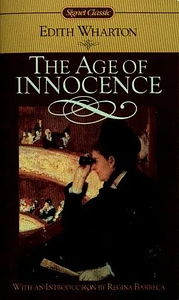Take a photo of a barcode or cover
The Kentucky cave-fish, the women dragged from the tents, Archer smelling the handle of the pink parasol, the lighting of straw in the Tuscan caverns, there are so many images here that I can never forget, especially not the heron wing in Madam Olenska’s hat. I cannot believe Edith Wharton existed. Her writing, her talent, her ability to convey the ache of the imaginary stretched taut against the trappings of reality are unmatched.
For Archer, women ought to be as free as “we” are… yet his condescending attitude toward May and his idolizing vision of Ellen blind him to their power, their influence, and their ability to live without him. He is central only in his mind—these women, to him, have no inner lives apart from where he is concerned, and that’s how he loses them both, in the end. Wharton’s ability to make a character so intensely dislikable deeply pitiable, almost heroic, is beyond words. Archer’s innocence throughout the novel is laughable, such a pleasure to read—and by the end of his life, he can’t even bring himself to face his eidolon, for fear of losing her again.
The most intriguing character here is May. She is the huntress, master of her world, capable of felling even the most elusive stag, which Archer thinks himself to be. The close third-person in which Wharton weaves her tale requires the reader to understand that any character that lacks guile, intrigue, deepness for Archer actually HAS these qualities tenfold. Wharton’s argument seems to be that men, in underestimating women, give them their power—it’s truly women’s action and inaction that propel the book forward, and by extension propelled New York society forward. I dropped the book when May revealed her trump card. Beaufort was wrong—there is no target this woman can miss, especially because she knows what her position in society necessitates. May Welland for the WIN.
For Archer, women ought to be as free as “we” are… yet his condescending attitude toward May and his idolizing vision of Ellen blind him to their power, their influence, and their ability to live without him. He is central only in his mind—these women, to him, have no inner lives apart from where he is concerned, and that’s how he loses them both, in the end. Wharton’s ability to make a character so intensely dislikable deeply pitiable, almost heroic, is beyond words. Archer’s innocence throughout the novel is laughable, such a pleasure to read—and by the end of his life, he can’t even bring himself to face his eidolon, for fear of losing her again.
The most intriguing character here is May. She is the huntress, master of her world, capable of felling even the most elusive stag, which Archer thinks himself to be. The close third-person in which Wharton weaves her tale requires the reader to understand that any character that lacks guile, intrigue, deepness for Archer actually HAS these qualities tenfold. Wharton’s argument seems to be that men, in underestimating women, give them their power—it’s truly women’s action and inaction that propel the book forward, and by extension propelled New York society forward. I dropped the book when May revealed her trump card. Beaufort was wrong—there is no target this woman can miss, especially because she knows what her position in society necessitates. May Welland for the WIN.
i got completely swept away by the tragic romance of this—such a perfect portrayal of people being suffocated by their perceived duties to polite society :-(( reading this at the same time as anna karenina was super interesting because of the parallels between anna and newland as they fall for the wrong person.
may was such an interesting character, potentially my favourite in terms of how well she was written. i love how wharton shows us through newland’s eyes his initial understanding of may as innocent and naive and his later comprehension that she is far cleverer and more manipulative than he gave her credit for. may knows what she wants and she knows how to use their stifling new york society to get it whilst newland is unable to utilise the same power for himself despite all of his male advantages.
just as in ‘the house of mirth’ the feminism in wharton’s writing seems wildly before her time, so fun to read and the ending (no spoilers!) was so in keeping with the rest of the novel, definitely one i will read again one day.
may was such an interesting character, potentially my favourite in terms of how well she was written. i love how wharton shows us through newland’s eyes his initial understanding of may as innocent and naive and his later comprehension that she is far cleverer and more manipulative than he gave her credit for. may knows what she wants and she knows how to use their stifling new york society to get it whilst newland is unable to utilise the same power for himself despite all of his male advantages.
just as in ‘the house of mirth’ the feminism in wharton’s writing seems wildly before her time, so fun to read and the ending (no spoilers!) was so in keeping with the rest of the novel, definitely one i will read again one day.
reflective
slow-paced
Plot or Character Driven:
Character
Strong character development:
No
Loveable characters:
No
Diverse cast of characters:
No
Flaws of characters a main focus:
Yes
funny
reflective
relaxing
slow-paced
Plot or Character Driven:
Character
Strong character development:
Complicated
Loveable characters:
Complicated
Flaws of characters a main focus:
Yes
informative
slow-paced
Plot or Character Driven:
Character
The Age of Innocence is a well-written, insightful novel, but it didn’t quite grab me the way I hoped. The story is set in 1870s New York high society and follows Newland Archer, a man torn between his duty to marry the sweet but conventional May Welland and his growing passion for her more free-spirited cousin, Ellen Olenska.
Edith Wharton does an amazing job capturing the rules and restrictions of upper-class society, and the book offers a fascinating glimpse into a world of rigid etiquette and suppressed emotions. Newland's inner conflict is interesting, especially as he wrestles with the expectations placed on him versus what he truly desires.
That said, the pacing felt slow at times, and the characters, while well-drawn, often felt distant and hard to fully connect with. I found myself wishing for more direct emotion or action, as much of the drama is internal or subtle. While Wharton’s observations on society are sharp, they sometimes overshadow the plot, making it feel a bit more like a social commentary than a story driven by the characters' choices.
Overall, it’s a beautifully written book that’s worth reading for its insights on society and tradition, but it may not be for everyone, especially if you’re looking for something more fast-paced or emotionally engaging.
Edith Wharton does an amazing job capturing the rules and restrictions of upper-class society, and the book offers a fascinating glimpse into a world of rigid etiquette and suppressed emotions. Newland's inner conflict is interesting, especially as he wrestles with the expectations placed on him versus what he truly desires.
That said, the pacing felt slow at times, and the characters, while well-drawn, often felt distant and hard to fully connect with. I found myself wishing for more direct emotion or action, as much of the drama is internal or subtle. While Wharton’s observations on society are sharp, they sometimes overshadow the plot, making it feel a bit more like a social commentary than a story driven by the characters' choices.
Overall, it’s a beautifully written book that’s worth reading for its insights on society and tradition, but it may not be for everyone, especially if you’re looking for something more fast-paced or emotionally engaging.
emotional
hopeful
informative
reflective
relaxing
sad
Edith Wharton, you would have been a huge fan of Evermore!
emotional
hopeful
reflective
sad








